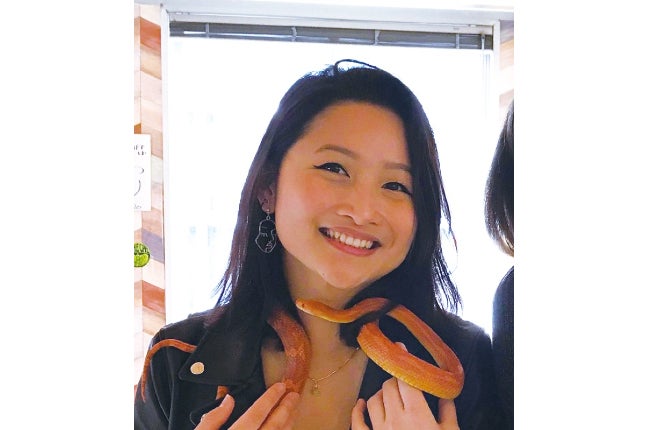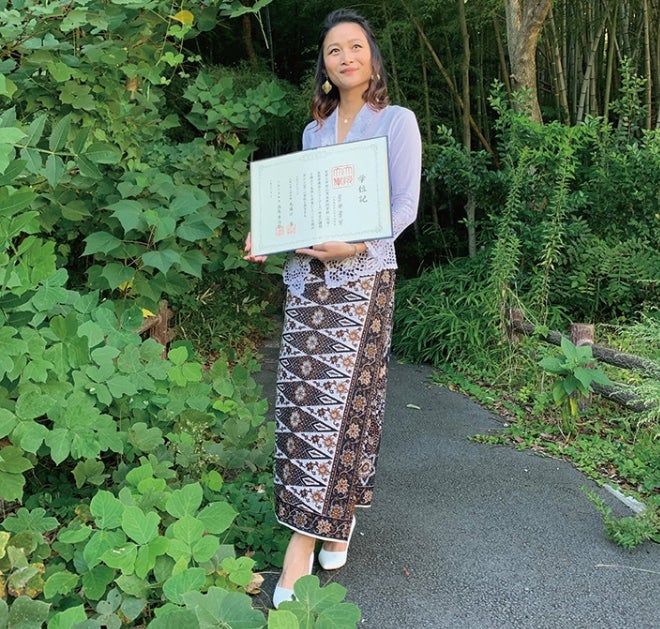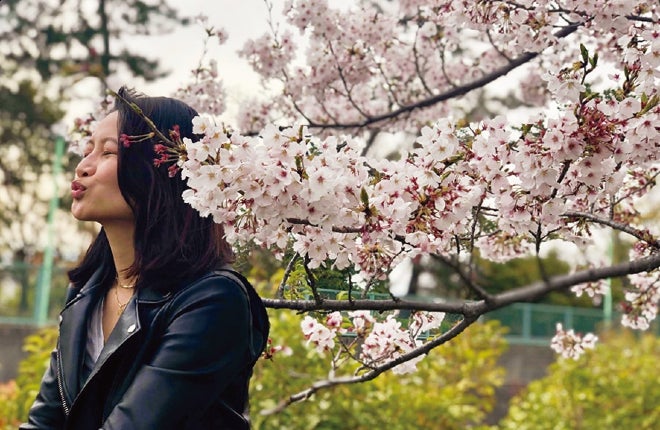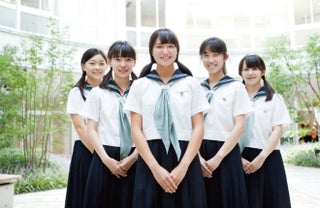Springでは日本の大学で学んだ経験のある海外の学生に、日本で学ぶことの魅力や日本・日本語への興味についてお話を聞いています。
シリーズ第17回目は、大阪大学大学院工学研究科で学ぶ、シンガポール出身のメイリクレア・アルバレズ・ミラーさんです。
Name: Ms. Mhairie Claire Alvarez Miller
(メイリクレア・アルバレズ・ミラー)
"Don’ t be afraid to make mistakes, no one will ridicule you for trying your best."

Currently studying at Osaka University (Master’s Program),
Chemical Science Course (CSC), Department of Applied Chemistry, Graduate School of Engineering
Educational Background
Primary to High School: ISS International School, Singapore
Q. What made you apply to a university in Japan?
I have always been interested in Japan, since I had many Japanese friends while I was growing up in Singapore, and have loved Japanese food my entire life. Considering Japan for the place of my tertiary education hence was a natural and exciting choice. There were three main reasons why I chose to study in Osaka University in Japan. The first was that Osaka University is quite a well-known and high-ranking national university in Japan, and it is strong in the sciences which was what I was looking for. The second reason was that English courses were offered for not only bachelor’ s but for master’ s courses as well. Last but not least, I was accepted for the MEXT government scholarship, which made it more appealing than my other university offers.
Q. What is your life like in Japan?
My master’s course requires me to research in a laboratory, and on weekdays I come into lab at 9:30 in the morning and do desk work or experiments until about 17:00 or later . Monday nights and Saturday mornings, my laboratory usually has meetings, so I spend a lot of time in my lab pretty much all week. 2 to 3 times a week I go to my part-time English teaching job after school on weekdays and also Sunday afternoons.
Other than usual lab work, last year I was given the opportunity to present my research at two conferences in Japan. First at the 9 9th CSJ (The Chemical Society of Japan) annual meeting, and second at the 15th International Symposium on Applied Bioinorganic Chemistry (ISABC15), which was hosted by my professor in Nara. There I was able to experience what it was like as a staff member to host a conference, and also as a presenter.
 With my friends at Osaka Castle
With my friends at Osaka CastleThere are 23 members in my lab, of whom 20 are Japanese (and they are all male!). Actually, I was a bit afraid of joining a lab at first since I knew that my department consisted of predominantly Japanese male students. However, it turned out much easier than I had anticipated, and I feel very fortunate that my lab environment is very conducive. Generally speaking, people from Kansai are a lot more open and friendlier than people from other parts of Japan. I am glad that I decided to come to Osaka instead of Tokyo.
Q. How did you study Japanese?
I learned Japanese language for 3 months just before I came to Japan, and I found that learning kanji was extremely difficult. I regretted I hadn’t paid much attention to learning Mandarin in primary and secondary schools, which would have helped learning kanji with much more ease.
 Graduation ceremony Sept 2019: posing with my bachelor’s certificate in Engineering
Graduation ceremony Sept 2019: posing with my bachelor’s certificate in EngineeringI also found different Japanese dialects difficult to understand. You are only taught formal standard Japanese in
classes, which is not usually spoken in daily conversation. Furthermore, I live in Osaka, so most people speak Kansai-ben (dialect) with rapid speed and I found it difficult to understand. Thanks to my laboratory environment I was able to slowly learn some Kansai-ben and some slang or at least how to interpret it.
Q. What is your future plan?
Right now , I am job-hunting in Japan, mainly looking at pharmaceutical companies and companies that are looking for chemical researchers for agriculture work. Japan has very high standard s and expectations, therefore working in a professional environment that pushes me to do my very best would be a great experience. I have been living here for over 4 years now , and I look forward to staying in this country for the start of my work life as well.
Q. Any message to students considering to study in Japan?
Japanese universities are very serious and you need to be committed to work hard and try your best to do all that you can. Therefore, it is important to study something that you are interested in, otherwise you may find it difficult to find the motivation to continue your studies.
 Spring 2019: Cherry blossom Hanami
Spring 2019: Cherry blossom HanamiLastly, my advice is to ‘Be confident!’ Don’ t be afraid to make mistakes, no one will ridicule you for trying your best in a language that isn’t your native. On the contrary, I have found that people help me by correcting my mistakes, allowing me to learn something almost everyday. Further, make an effort to learn about the culture as well because it is deeply rooted in every Japanese person.
※大阪大学に関する情報はこちら
https://spring-js.com/japan/674/
Visit our website to read about other students studying in University of Tokyo, Nagoya University, ICU and more!
東京大学、名古屋大学、国際基督教大学、大阪大学などで学ぶ留学生の皆さんの記事はこちら
<Study in Japan>
https://spring-js.com/education/education01/study-injp-and-jp/






_Nov.jpg?optimize&width=320)

















